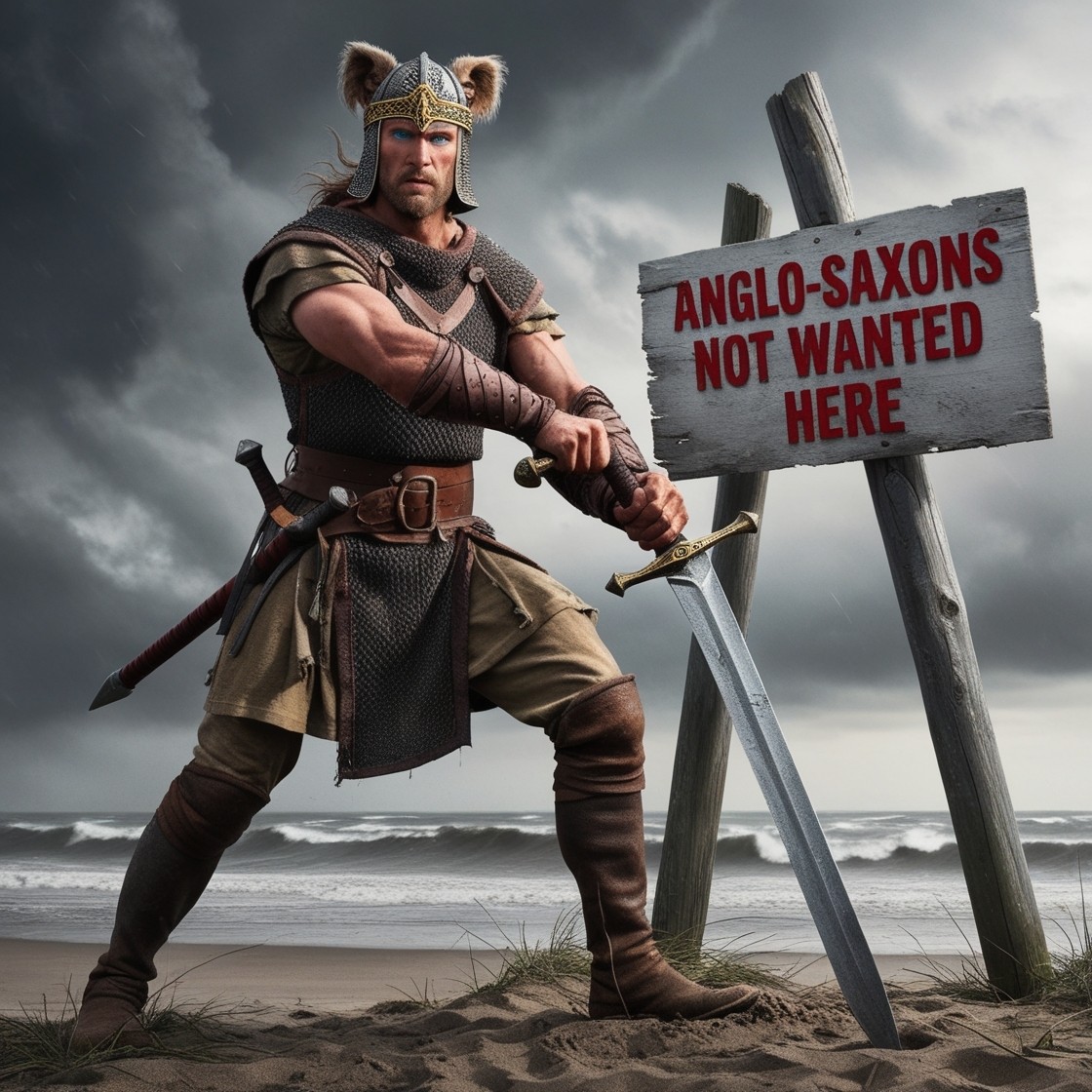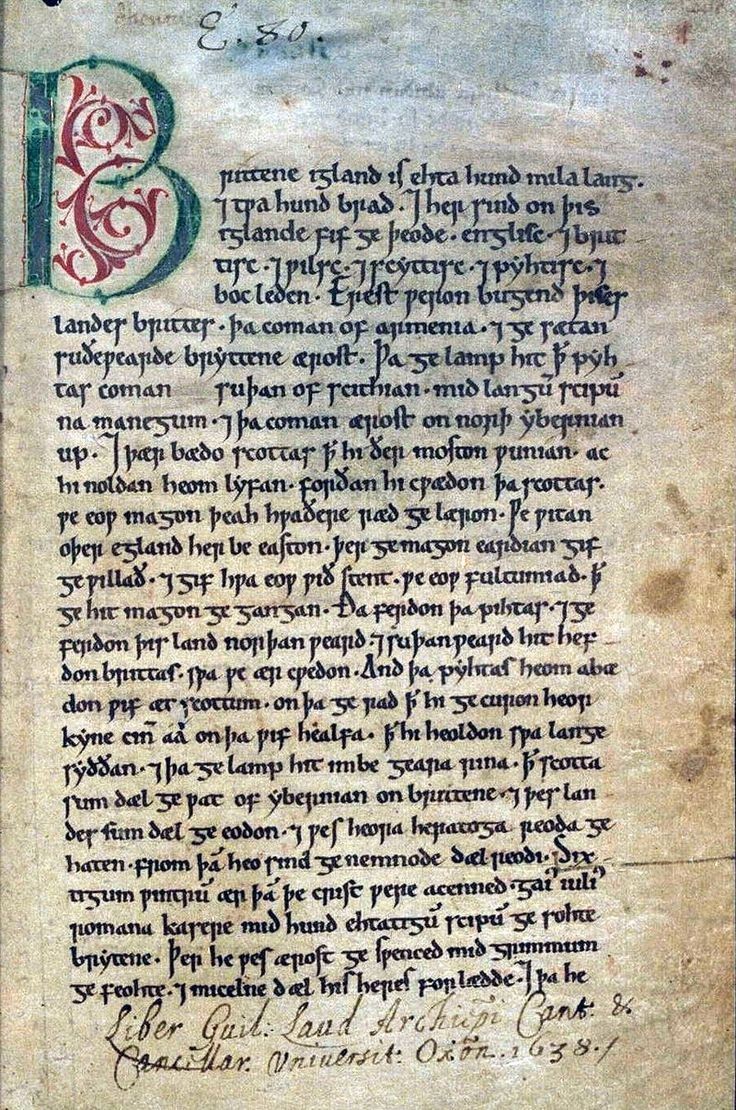
Whilst browsing the papers etc this week, I noticed a couple of articles that implied Anglo-Saxon was no longer an acceptable term to use when describing certain periods of the history of the “English speaking peoples“ as Churchill once called us.
Apparently, it has Nazi connotations for people in America and also reminds them of slavery and oppression. Naturally, the great and the good over here have taken it up and decided that they don’t like the term either.
Cambridge has retitled its Anglo-Saxon and universities up and down the country are keen to describe that period of history in terms of early middle or late English, but have kept the Celtic, Roman and Norman labels to denote other major historical occupants of these isles as apparently they are none threatening.
The argument goes something like this:
Anglo-Saxons were predominantly a Germanic and Northern European lot, whose mythology was much admired by Hitler. Therefore, acknowledging that this played a central part in the development of the English is unacceptable to all good people so it must go. On the American side, “wasps”, white Anglo-Saxon Protestants were see as the main drivers of slavery and so unacceptable.
It seems on the face of it, that if an unacceptable person likes something, that something by association must be bad. I believe Wagner still has a lot of problems due to this sort of thinking, although to be fair, his personal beliefs didn’t help his case.
Hitler was also a vegetarian and forbade German women to smoke when pregnant, ages before these things became mainstream in today’s society; but those bits can be ignored. Again, the greater good is cited as a reason. Africans played a large part in the slave trade and their rulers made an absolute fortune out of it, but again, that can be ignored for the greater good.
I hope you can see my problem here, about letting other people decide for you what is and isn’t ok. I find it endlessly fascinating that people and events can be used in this way; to police current moral boundaries and separate the sheep from the goats so to speak. No wonder spin works so well.
On the other hand, in very recent times, we have had things identified as corrupt, immoral and sometimes illegal, based on western moral codes, dismissed as irrelevant because the people involved were deemed good people and so we must put up with such shenanigans for yet again the “greater good”. Calling them to account would apparently result in the destruction of the civilisation because then there would be nothing to stop bad people getting into power and you all know what will happen then!
You’ll have to excuse the infantile composition of this argument, because that is exactly how it is presented to the public and a lot of them seem to buy it. It is the superlative form of that famous saying “always keep tight hold of nurse, for fear of finding something worse “. An intelligent twelve-year-old would see the contradictions. As my own children used to say to each other, “you’re not the boss of me so don’t tell me what to do”!
Unfortunately, the machinations of the modern world seem to be so complicated and the useful information to evaluate it by so thin, and half the time unavailable to the public; most people just accept what is put out and shrug their shoulders.
But where does this leave the Anglo-Saxons? Looking at the historical records, the Anglo-Saxons have been part of the recorded history of Britain for centuries.
The Venerable Bede wrote of them in his chronicles and also gave us insight into how they came about. The Saxons along with the Angles, came over from Northern Europe and settled in large numbers here, mixing with the native tribes after the Romans left. They were so successful at integrating , that people on the continent started calling the Britons in the main part of the island Anglo-Saxons, to distinguish them from the continental Angles and Saxons who were not amalgamated at that period. They contributed some memorable kings and enhanced the culture which had degraded since the Romans left.
They were also responsible for uniting the many tribes that resided in that part of the island into a single people, known today as the English. A lot of our villages and market towns have their names derived from Anglo-Saxon speech; at least at the moment. In common with other settlers, the Saxon language, along with the other different languages people spoke, eventually combined to produce the first iteration of the English language. This was further refined at the time of the Norman invasion and the first official codification in the eighteenth century eventually arrived at the English language we speak today.
In history, this dominant group amalgamated with other smaller tribes and influenced not only the creation of England, but held trading partnerships with other tribes at the further outposts of the islands, such as the Picts, who were there before long before the Scots and the Welsh and Cornish, who still retained a lot of the original Britannic/Cwmbran/stock, having only come into contact with the Anglo-Saxons mainly through trade or border disputes . However, no one has suggested removing and renaming them, and their history can still be found intact in the historical record if you look. Eventually Cornwall and Wales came under the jurisdiction of the Anglo-Saxons, but Wales still retained a portion of independence and its own separate language.
Like the flag of St. George, the phrase Anglo-Saxon has acquired sinister overtones in which it is deemed too dangerous to be out in public life. I wonder how long it will be before white English goes the same way?
I can foresee a time when the fairy stories for children will start with once upon a time, long long ago, there was a land populated by white people, who were very cruel to people who lived in other parts of the world…….”
This quick excursion through the development of the English as a people, should show you that although classed as a “mongrel race”, by some, all the people who have populated these isles apart from the Roman invasion, have been of white Northern European extraction and it is this extraction that forms the basis of our culture and history.
With the Roman invasion, it is quite possible that some of their soldiers were of middle eastern or African extraction; but certainly never enough to have anything like an impact on the development of the population. Those who weren’t killed fighting, went home at the end of the occupation, or before, if their tour of duty was over.
Meanwhile, the Picts were having their own problems in the north, with the Scots and the Irish fighting with the Norwegians and Danes for the top part of the island and surrounding islands with them caught in the middle. For all their claim to be identifiably Scottish, they are no better than the English in terms of their genetic mix. This is by no means a criticism of the Scots, or the Welsh or Cornish, why shouldn’t they cleave to their identity and history if they want too?
What I can’t understand is why the English are not allowed the same courtesy. If you think about it, only the white English are having their history and traditions rewritten for future generations; so far, the Welsh and the Scot’s are allowed to continue. It how long will it be before the smaller kingdoms in the island will be required to adjust theirs, to fit in with the new world view? Even something as small as changing the term BC to CE, so as not to offend non-Christian’s is a small nail in the history of the country, which has allowed other things to follow.
In this sense, the English are the canary in the coal mine. If those that rule us can redraw the history of the largest kingdom in the island, then they can surely do it for the rest if they want too.
It is so important that all the peoples on this island stick together and support each other’s history, if we want to maintain Britain and its history and traditions.
Don’t let the Anglo Saxons be wiped out. It’s in everyone’s best interests.